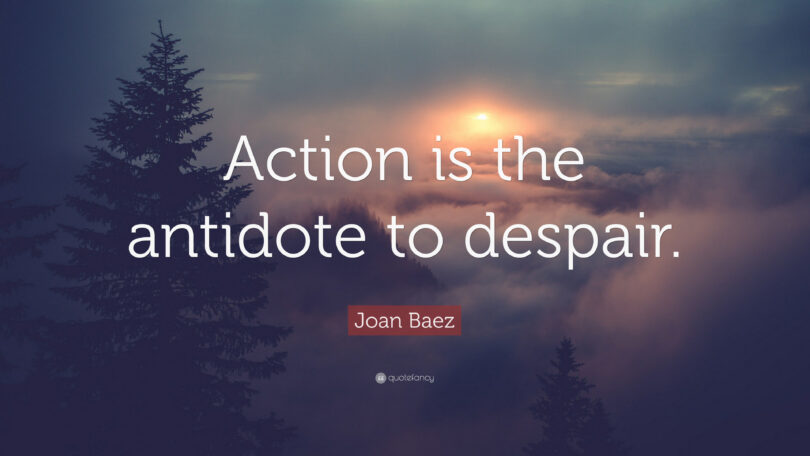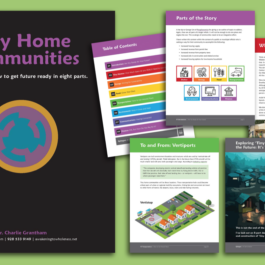What are the top 10 trends for the next ten years? Download the report here.
How is everyone doing? The last several years have tested our resilience, challenged us to explore our priorities, and driven many people and organizations to languish.
Anxiety and depression are at an all-time high – 32% of adults report symptoms of anxiety or depression.
The “great resignation” has turned into “quiet quitting” and reassessment of our boundaries for work and employers.
And on top of everything, we are tired. Languishing is the opposite of flourishing. It’s defined as the absence of well-being. Languishing dulls your motivation, disrupts your ability to focus, and is characterized by apathy. According to an article at Better Up, 55% of the workforce is languishing.
We have big problems to solve. But in today's world, we are facing unprecedented levels of uncertainty, complexity, and fatigue. People are struggling to keep up, and innovation is suffering under the weight of these challenges.
What can we do to address these problems and move forward?
The answer lies in collaboration and Strategic Doing. Strategic Doing has been tried and tested with over thirty years of research at Purdue’s and the University of Northern Alabama’s Agile Strategy Labs. It is a discipline that is now practiced worldwide.
1. Use the right tools for complex problems.
Complex problems require unusual tools. For example, increasing affordable and quality early childhood education in a region – that’s a complex problem.
Can we solve it by googling, asking an expert, or finding a published set of instructions? Nope. That’s because a problem like this has multiple drivers, there is no simple solution at hand, and no person, team, or organization can solve it alone. Early childhood education is a complex problem because it has to be addressed by a broad range of stakeholders: school districts, private in-home providers, government officials and organizations, childcare centers, and community leaders. There is not one copy-paste solution because it requires customization to local resources and linking and leveraging the assets of all partners in the region. Such complexity makes it easy to get stuck and run out of steam.
But Strategic Doing is an unusual tool. It’s powerful for building trust, creating or rebuilding forward momentum, and finding solutions to complex problems. How? Because it involves bringing together diverse groups of people to work towards a common goal, starting small and building trust along the way. Strategic doing encourages a psychological shift towards what is possible, creating a sense of optimism and empowerment that can be contagious.
2. Collaborate to power innovation.
Creativity and innovation is a team sport. We can’t rely on the myth of a genius lone creator who doesn’t need other people’s ideas and support to build on.
What’s more, collaboration is more than just cooperation. The power of Strategic Doing lies in its ability to create a culture of collaboration and innovation within a community or organization. Through pilot projects and iterative learning, people learn the skills they need to engage in strategic doing, including communication, collaboration, and critical and creative thinking.
For example, in the Iowa City area region, we are using Strategic Doing to increase affordable and quality early childhood education. It empowers us to build trust and relationships between organizations that have traditionally seen themselves as “competitors,” such as childcare centers and private in-home providers. As these participants share their assets and look for opportunities to link and leverage them, they are realizing that they need to work together to achieve new and innovative solutions. A county wage enhancement program is one such solution.
3. Pursue a series of small actions that lead to big results.
Strategic Doing is a tool that works for these challenging times because it helps us work together and break down complex problems into manageable steps. This is how we can create real change and make progress toward a brighter future.
For example, our Early Childhood Education group is working toward a Joint School Readiness summit. This group consists of representatives from school districts, providers, government, childcare centers, and community leaders. Together they are using small steps every few weeks to organize and host the event. First, they created a planning committee that ensures representation from all stakeholders. Next, they decided to complete small planning tasks such as breaking into smaller committees and refining the goal for the summit to help them create an impactful event. One step at a time, they are making progress together.

Ready to get unstuck and ignite innovation in your domain?
There is no question we are in challenging times, and there are many complex problems to solve. But in the end, it’s all about people. People power change. And with the right tools, you can help them overcome inertia and ignite new energy to adapt to and anticipate our ever-changing world.
Is your community or organization in need of a jump start – to implement your strategic plan, address a complex problem, or create a whole new vision? No need to wait for someone else to figure it out, do the right thing, and save you. You are the calvary. If you embrace the power of Strategic Doing, you can start building a brighter tomorrow – today.
If you enjoyed this post, please subscribe to our newsletter.

Kate Moreland
Kate Moreland is an experienced leader and CEO who understands the need for collaboration to spur innovation and solve big problems. She is a master collaborator and certified in Strategic Doing. Kate has experience as a client of NEXT Generation Consulting, using the strategic foresight process to design the Johnson County Iowa “ALL IN!” plan. She believes communities are only as strong as the people and organizations who reside there.
Yasemin Arikan Promoted to Director of Futures Research
NEXT Generation Consulting (NGC) announced the promotion of Yasemin Arikan to Director of Futures Research. Arikan will lead the company’s efforts to...
Is Your Housing Market Ready for Your Future?
One of the biggest problems facing many cities and towns is inadequate housing. This problem is most acute for seniors, veterans with disabilities, and low-income groups ...
Three Things Martha Stewart Gets Right About Return to Office (RTO)
The original influencer and the person who invented the "Home" retail category, Martha Stewart, became the latest CEO to tell employees to get back to the office five day...








